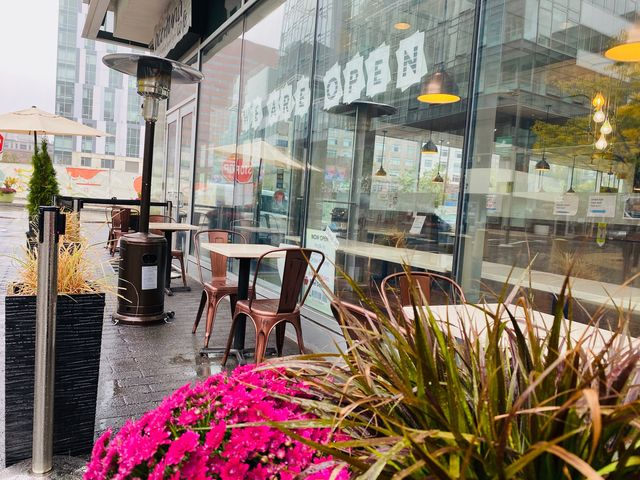
Covid-19 Turns Up the Heat at Boston Restaurants
Tables six feet apart. Indoor air filtration. Service only for masked customers. Regular sanitizing. Despite the stringent Centers for Disease Control guidelines that aim to make indoor dining safe, outdoor spaces remain a popular alternative for those worried about contact and crowds indoors. With Cambridge’s harsh winter around the corner, local restaurants are brainstorming ways to keep guests warm.
“We have found that having outdoor seating definitely helped,” says Gina C. Kurban, co-owner of Aceituna Grill, a Mediterranean restaurant. Aceituna normally has three branches, but because of decreased business, only the Kendall Square location remains open. “The pandemic has just completely changed everything,” she says. “We’ve been doing just a fraction of our normal business.”
Before, Kurban says, a typical day would see 500 customers. Now, on a busier day, 200 guests will come in.
In this, Aceituna isn’t alone. “We’re down 85 to 90 percent in sales. I think the winter will bring this down further — there won’t be holiday parties, there won’t be events,” says Steven L. Kurland, partner and general manager at Za Pizza Kitchen at Kendall Square.
Anticipating such difficult losses, Tom Brush, a partner at Felipe’s Taqueria, says the restaurant has already established a new model to adapt to the pandemic: Staff seat patrons and implement QR code orders, minimizing server-customer contact.
“We’ve had to dramatically increase our staffing; we have much higher staffing costs,” Brush explains. “Currently, even with our new model, we have not modified our prices at all from last year.” An average customer can still spend $10 on a meal.
In an effort to combat low sales, Aceituna launched a program for free delivery in areas around Boston. Each night, they drop off lunches for regular clients in different suburbs. Suburban deliveries did not grow as much as anticipated, but Kurban believes this program will get them through the winter.
Restaurants across Boston are working to ensure customers continue enjoying falafel, chimichangas, and pizza this winter — even if it means braving the outdoors.
At Aceituna, staff are planning to furnish their outdoor patio space with heaters, though they don’t know if they will last through the winter.
Felipe’s has five patio tables with propane heaters, but Brush expects that the heaters won’t make a huge difference once the temperature drops below 45 degrees. “If people want to sit outside, we’re happy to continue that,” he says. “But we don’t expect those propane heaters to generate enough heat to entice people to dine there a lot.”
Even though the Cambridge city government helps obtain permits for heaters, Brush says there is a significant financial toll on the part of restaurants. A large propane tank costs about $20 dollars to refill and only lasts a night, making heaters a risky business proposition.
“You really will only be able to utilize [heating lamps] on busy nights, and it is an expense that may or may not be offset by the business,” Brush says. “We certainly are going to use them, but we don’t expect a tremendous amount of interest in [dining] outdoors.”
However, a smaller turnout during the winter does have one upside: A decrease in customers will reduce the risks servers face. “Once those temperatures drop, it will be difficult for some of the servers to service the people out there. But I think at the same time customers stop eating outside,” he says.
Unlike Felipe’s and Aceituna, big chains can afford to invest in expensive igloos for outdoor dining. These dome-shaped havens are often embellished with extra decorations to stay festive in the winter months. The owners of Boston-based restaurant Pier Four have purchased nine igloos which each seat two to six guests with limited contact with servers. The candlelit geodesic domes can be heated to customers’ comfort. Still, they come at a cost: Reservations for two and a half hours cost $300 to $550.
Kurland says the Za Pizza ultimately decided against investing in outdoor heating. “To really [install igloos] properly, you have to get a tent and all this stuff,” he says. “And that is super expensive. I’m not convinced ... that we’ll get that money back.”
By building one another up, local businesses hope to continue to serve the Cambridge community. Despite what the challenges winter will pose, well-established restaurants like Aceituna and Felipe’s hope to preserve the flavors of long-standing traditions.
“I think we’re doing the best we can to be here and be available for people. At this point for us it’s not about making money — it’s about getting enough money to keep our staff going,” Kurland says. “I’m very active with the city and with local business organizations [in trying] to help other restaurants.”
Whether or not they provide outdoor heating, small local businesses will continue to offer a more intangible warmth to get customers through the winter.


